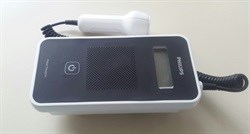
The power-independent Doppler is a clinical innovation that addresses local needs and enables healthcare workers to detect foetal distress during labour. It easily and accurately counts the foetal heart rate while the mother is in labor. A slowing of this heart rate towards the end of a uterine contraction is an important indicator that a foetus is not receiving enough oxygen and may suffer brain damage or die. If this is detected early enough, a midwife or delivering nurse can take the necessary actions to save the child.
Current methods to measure the foetal heart rate are either too expensive, too inaccurate or rely on replaceable batteries or electricity to run; this is especially designed to empower midwives and delivering nurses to give better care.
"It is very hard to do an accurate measurement with a Pinard-stethoscope, because you need to be able to hear the foetal heart well and count the rate correctly. It is often also uncomfortable for the mother. A Doppler ultrasound foetal heart rate monitor is a good solution but the current monitors on the market require mains or battery power and are not robust enough," states, Anneke Jagau, a midwife working for PET.
It will be commercialised by the Philips Africa Innovation Hub, which is the centre for developing innovations 'in Africa-for Africa', in the areas of healthcare, lighting and healthy living. The Hub has unveiled the first prototype, underpinning its commitment to the partnership. The prototype is subject to clinical testing and regulatory approval, before release for general usage.
PET has been working on the development of the hand cranked, Wind-up Foetal Doppler for many years and it verified the positive impact of the device in tests in Uganda, where 60% more cases of abnormal foetal heart rate were detected in labour, compared to the standard Pinard-stethoscope.
Maarten van Herpen, Head of the Philips Africa Innovation Hub, states, "The company is open to collaborations with key stakeholders, including governments and NGOs, to create impactful innovations that matter to people and address the key challenges that confront society. PET has invested many years in the development of this important idea. I am honoured that PET has chosen the company as the best positioned to commercialise it and make it available across Africa".
"We are very excited about the collaboration with Philips," said Dr Francois Bonnici, Director of PET and Director of the Bertha Centre for Social Innovation at the University of Cape Town, "We chose to work with the company because of a strong alignment on the mission to improve people's lives with meaningful innovation. As a market leader in healthcare, it will be able to make our innovation available and affordable for frontline health care workers across the African continent."